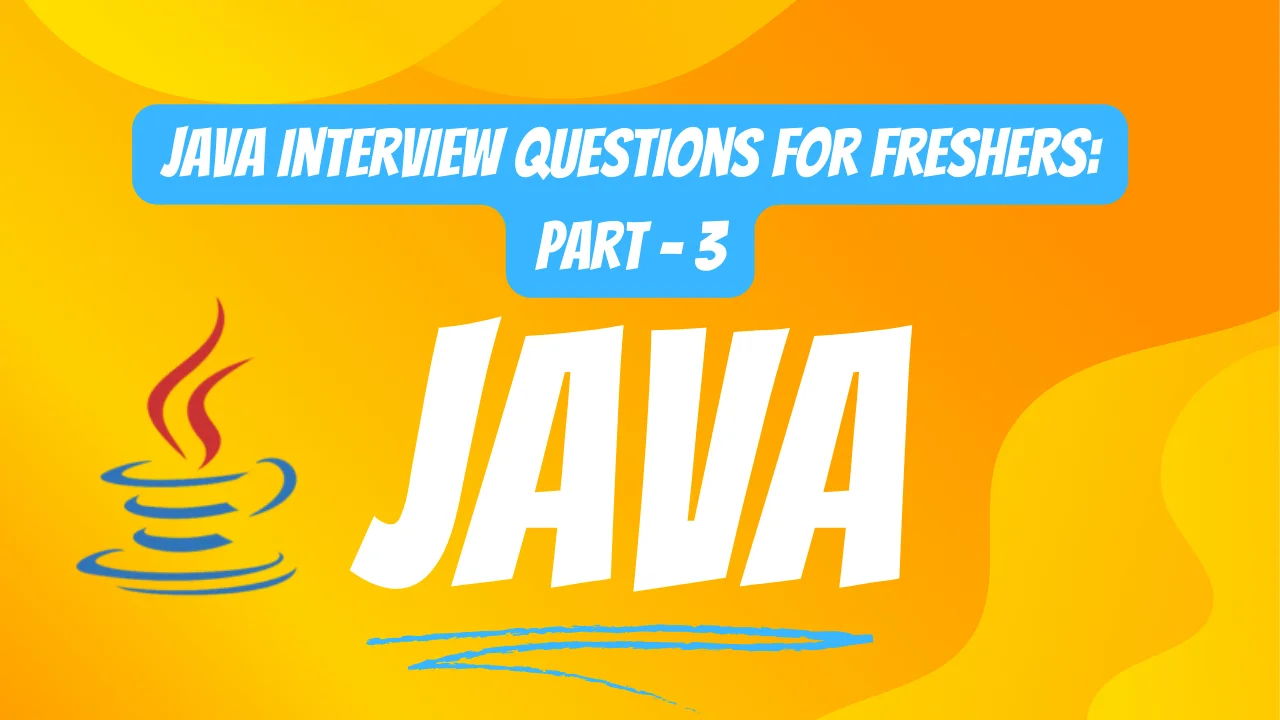Java Interview Questions for Freshers: Part - 3

21. Determine the output of a Java program and explain the reasoning behind it.
To provide an accurate output, I’d need the specific code in question. However, if you have a particular code snippet you’d like me to analyze, feel free to share it, and I can help determine its output and explain the reasoning.
22. When can you use the super keyword?
The super keyword in Java is used to refer to the superclass’s members (variables, methods, constructors) within a subclass. It can be used to call the superclass’s constructor and access the superclass’s methods or variables from the subclass when they are overridden or hidden.
23. Can the static methods be overloaded?
Yes, static methods in Java can be overloaded just like instance methods. Overloading occurs when multiple methods within the same class have the same name but different parameter lists.
24. What's the significance of the 'main' method being static in Java?
The main method being static allows it to be executed without needing to instantiate the class. This method is the entry point for a Java program, and the static keyword ensures that the method can be called by the JVM without creating an instance of the class.
25. Can the static methods be overridden?
No, static methods cannot be overridden in Java. When a subclass declares a static method with the same signature as a static method in its superclass, it simply hides the superclass method, but it’s not considered overriding.
26. Distinguish between static methods, static variables, and static classes in Java.
- Static methods: Belong to the class rather than to any specific instance. You can access them without the need to create an instance of the class.
- Static variables: Also known as class variables, these are shared among all instances of the class. They maintain a single copy regardless of how many instances exist.
- Static classes: Java doesn’t have “static classes” per se. However, nested classes declared as static are static nested classes, meaning they don’t have access to instance-level members of the enclosing class.
27. What is the main objective of garbage collection?
Garbage collection in Java aims to automatically manage memory by reclaiming memory occupied by objects that are no longer referenced or reachable by the program, allowing efficient utilization of memory and preventing memory leaks.
28. What is a ClassLoader?
A ClassLoader in Java is responsible for loading classes into memory as required by the application. It dynamically loads Java classes into the Java Virtual Machine (JVM) at runtime. There are different types of ClassLoaders (Bootstrap, Extension, System or Application), each responsible for loading classes from different sources.
29. Which part of memory, Stack, or Heap, undergoes cleaning in the garbage collection process in Java?
The garbage collection process in Java primarily cleans up the heap memory. It identifies and removes objects that are no longer reachable or referenced by the application, freeing up memory for future allocations. The stack memory is managed differently, typically through stack frames that are pushed and popped during method execution but are not managed by the garbage collector.
30. Explain the concepts of shallow copy and deep copy in Java.
- Shallow copy: It creates a new object and then copies the non-static fields of the current object to the new object. If the field is a reference to an object, the reference is copied, not the actual object. Both objects will refer to the same memory location for the referenced objects.
- Deep copy: It creates a new object and, for each field, copies the field to the new object. If the field is a reference to an object, it creates a new copy of the referenced object. Thus, changes in the original object won’t affect the copied object.
These concepts are essential when dealing with object cloning and ensuring the integrity of the data during the copying process.
In conclusion,
mastering Java is a crucial step for freshers looking to excel in the competitive IT landscape. Our compilation of Java interview questions for freshers is designed to be a comprehensive guide, helping you prepare with confidence. Whether you’re just starting your career or aiming for new opportunities, a solid understanding of Java is a valuable asset.
Ready to take your Java skills to the next level? Explore our top-notch Java Training in Chennai. Our expert instructors and hands-on approach ensure that you not only ace interviews but also thrive in real-world scenarios. To kickstart your journey to Java excellence, contact us at +91 9159-333-334. Secure your future today with the best Java Training in Chennai. Don’t miss out on the chance to propel your career forward!





